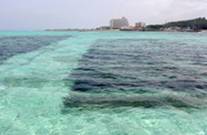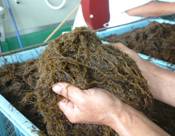
Cladosiphon has established use as a sea vegetable
and, along with Nemacytus, is widely known commercially as "mozuku".
These genera are also a source of the group of bioactive sulphated
polysaccharides known as "fucoidan". Fucoidan is included generally
in brown seaweeds such as Mozuku, Konbu, Wakame, Kelp and other seaplants,
among which Okinawa Mozuku has obtained its superiority for much more Fucoidan
content. Our Fucoidan powder is extracted only from Okinawa Mozuku.
  
Brown seaweed is
an important general nutritive tonic in essentially every land in which it
grows. Until recent years, it was eaten almost exclusively and universally by
the Japanese. Studies have shown that the Japanese intake of brown seaweed is
significantly responsible for that country's dramatically lower breast cancer
rates, as well as the presence of less obesity, heart disease, respiratory
disease, ryeumatism and arthritis, high blood pressure, thyroid disease,
infectious disease constipation and other gastrointestinal ailments.
The prefecture of
Okinawa, whose inhabitants enjoy some of the highest life expectancies in
Japan, also happens to have one of the highest per capita consumption rates of
brown@seaweed per person per day. It is noteworthy that the cancer death rate
in Okinawa is the lowest of all the prefectures inJapan
FUCOIDAN Powder is
so valuable and expensive that it can be extracted only 1% out of the raw materials
of Okinawa Mozuku seaweed.
Please click 1) Effects of Fucodian extracted from Mozuku and 2) at World Journal of Gastroenterology on Chronic Hepatitis C virus infection in the publication.
Fucoidan Powder has been applied on foods
and beverage, and cosmetic such as lotion, soap and shampoo for hair and skin care
products.
GUIDEBOOK OF MOZUKU FUCOIDAN
 
 at http;//www.abecancer.com/ at http;//www.abecancer.com/
Dr. Abe's world tour for the Latest Fucoidan Seminar
Please click the face cover for viewing the contents.
|

